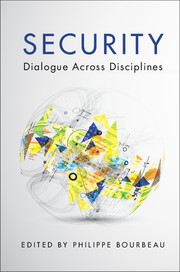Book contents
- Frontmatter
- Contents
- Notes on contributors
- Acknowledgments
- 1 A multidisciplinary dialogue on security
- 2 Philosophy: The concepts of security, fear, liberty, and the state
- 3 Anthropology/ies: Moving beyond disciplinary approaches to security
- 4 Geography: Securing places and spaces of securitization
- 5 Sociology: Security and insecurities
- 6 International relations: Celebrating eclectic dynamism in security studies
- 7 Psychology: The phenomenology of human security
- 8 International political economy: Conceptual affinities and substantive differences with security studies
- 9 Criminology: Reimagining Security
- 10 International law: Between legalism and securitization
- References
- Index
1 - A multidisciplinary dialogue on security
Published online by Cambridge University Press: 05 December 2015
- Frontmatter
- Contents
- Notes on contributors
- Acknowledgments
- 1 A multidisciplinary dialogue on security
- 2 Philosophy: The concepts of security, fear, liberty, and the state
- 3 Anthropology/ies: Moving beyond disciplinary approaches to security
- 4 Geography: Securing places and spaces of securitization
- 5 Sociology: Security and insecurities
- 6 International relations: Celebrating eclectic dynamism in security studies
- 7 Psychology: The phenomenology of human security
- 8 International political economy: Conceptual affinities and substantive differences with security studies
- 9 Criminology: Reimagining Security
- 10 International law: Between legalism and securitization
- References
- Index
Summary
Security is omnipresent in our daily lives. From apparent trivialities, such as locking the front door, wearing a helmet to cycle with the kids on a bright Sunday afternoon, or remembering an increasing number of passwords, to more significant issues like dealing with domestic violence, monitoring nuclear proliferation, and limiting ethnic conflicts, security, it seems, is everywhere.
Likewise, the ubiquity of security in almost all social sciences disciplines is undisputable. Groundbreaking work by prominent criminologists has placed the concept of security at the centre of criminological scholarship for many years to come (Loader and Walker 2007; Shearing and Wood 2007; Wood and Dupont 2006; Zedner 2009). In Anthropology, security is an emerging research area that has recently gained substantial traction (Goldstein 2010, 2012; Hamilton and Placas 2011; Holbaard and Pedersen 2013). Geographers have been active in highlighting the ways in which biopolitics, territoriality and resources deeply influence security considerations and vice versa (Dalby 2009; Ingram and Dodds 2009; Le Billon 2012). Security has been one of the paramount research themes in International Relations scholarship for a long time, but only recently has this focus of this framework shifted, permitting previously marginalized perspectives to be increasingly embraced (Abrahamsen and Williams 2011; Adler and Pouliot 2011; Buzan and Hansen 2009). In sum, scholars from all manner of social sciences are turning their attention to the study of this complex concept.
Despite this demonstrated interest in security studies within a host of academic fields, scholars rarely communicate their findings across disciplines. Students of security do not approach the study of security from a shared paradigm, but from a variety of theoretical and conceptual viewpoints fragmented across disciplines. In some cases, these various theoretical viewpoints are seen as competing against each other; in most cases, however, these viewpoints are simply expressed and developed in near total disciplinary isolation. Within any given discipline, work done in the other social sciences on security is at best briefly mentioned, at worse, politely ignored.
This book attempts to bridge these disciplinary canyons. The aim is not to provide a comprehensive theory of security applicable across disciplines, cases, and areas. We do not intend to offer a unique paradigm within which to conduct research on security, nor do we want to propose a unified or orthodox view of the concept. Rather, in revisiting security from an interdisciplinary perspective, the book makes two critical contributions.
- Type
- Chapter
- Information
- SecurityDialogue across Disciplines, pp. 1 - 21Publisher: Cambridge University PressPrint publication year: 2015
- 3
- Cited by



